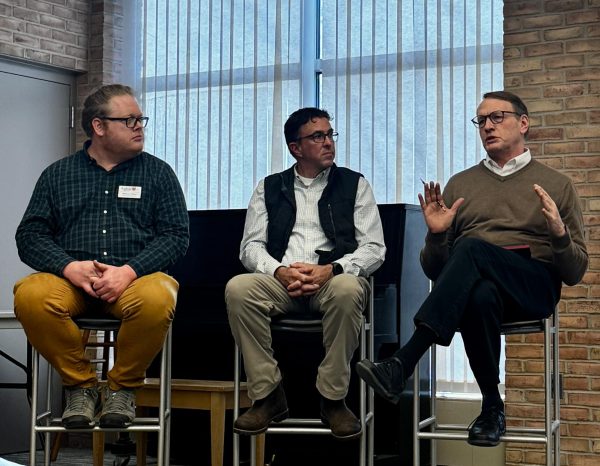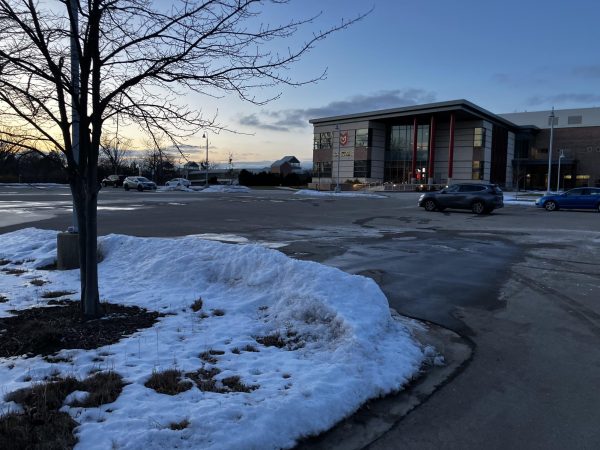Calvin geology course offers research opportunity to freshmen
The Calvin College department of geology, geography, and environmental studies offers first-year students a unique research opportunity through the course First Year Research in Earth Sciences: Dunes, better known by the abbreviation FYRES. The five-credit course is offered every fall and consists of a classroom experience and a lab at the Lake Michigan dunes every Thursday. This course is unusual because it offers an opportunity for freshman to conduct actual scientific research.
There are many reasons why this course is popular among students. Freshman April Volzer, a current FYRES student, talked about how much she enjoys getting to go out to the dunes every week. Speaking about what parts of her research she enjoys, Volzer said, “My favorite part of the research was being on the wind data team. The field work was fun and I liked how it was real research, not just theoretical studying.” While many of the students in FYRES plan to major in the science field, FYRES is also a valuable experience for non-science majors. This year’s cohort consisted of majors as diverse as political science, computer science, English, biology, marketing, nursing, environmental science and music. Volzer, who is an English and music double major, talked about the benefits of FYRES for non-STEM majors. She said, “FYRES is very valuable for non science majors. Coming to college, I thought that this kind of research was reserved for science majors in upper level classes. I didn’t think that all Calvin students would have opportunities to conduct scientific research. I think that this fits nicely with Calvin’s focus on core curriculum and being a well-rounded student.”
Another FYRES student, Jacob Mulder, shares Volzer’s enthusiasm for spending time on the dunes and satisfaction at doing real world research, saying, “I like how FYRES is a class where we do actual research and solve real world problems.” He also noted the sense of community that is created among the FYRES students, particularly on the trips to and from the dunes. This sense of community is also created through the fact that most of the FYRES students were also together at orientation and are in the same First Year Seminar class together. Being part of this group can help ease the transition to college. Mulder strongly advised prospective students to “take the FYRES class!”
The labs in the first part of the semester involve students learning about different dune research methods such as wind measurements, sand traps, total station surveying, stadia rod surveying and GPS mapping. Students have the opportunity to get certified with advanced equipment such as the Sokkia Total Station, a very precise way of making a topographical map, and the GPS mapping units.
The second part of the semester is spent participating in ongoing research projects. This year’s projects include two studies at Kitchel-Lindquist-Hartiger Dune Preserve (KLH). One is management techniques at a blowout (a type of dune), and another is an examination of another blowout that was requested by the KLH board, who fear that the dune may be posed to cover a parking lot. Research projects in other locations this semester include an investigation into the invasive wooly hemlock, a tree-killing parasite; a study about the endangered species pitcher’s thistle in the Rosy Mound Natural Area; and an examination of a dune. This work is overseen by upperclassmen mentors.
Both the labs and field work give students the opportunity to get to know the Lake Michigan dunes quite well and to spend part of almost every week outdoors. FYRES student David Martinez-Vasquez says that this is his favorite part of the class, and he describes the Lake Michigan dunes as “beautiful.” His favorite research experience was a project conducted last week at North Beach Dunes. Martinez-Vasquez talked about how being on the dunes is also significant from a Christian point of view, saying, “I see God’s power in nature, like the very windy dunes at North Beach.”
FYRES is taught by Dr. Deanna van Dijk, who is passionate about dunes. She is a physical geographer by training and has been studying the Michigan dunes for nearly twenty years. In describing the things about FYRES that excite her the most, van Dijk echoed the comments of her students. She noted the spread of students across majors, saying she enjoyed “that the course is offered to students across majors, not only students planning to go into a science. Usually science and non-science students take the course in equal numbers, with equal enjoyment and equal success rates.” Van Dijk also cited as one of her favorite things about the class “the opportunity for students to have a real research experience in the course, with real frustrations, hard work and the joy of discovery. This is real science in action!”






